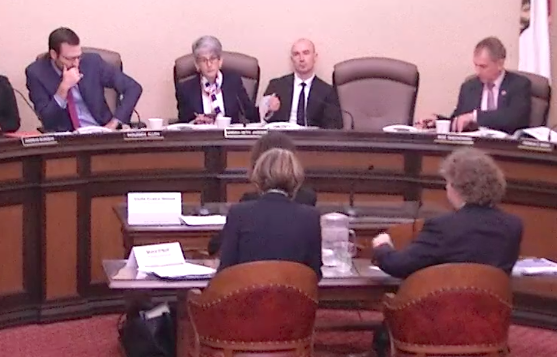Two Senate committees--Judiciary and Environmental Quality--held a joint informational hearing yesterday to discuss whether the California Environmental Quality Act is slowing or impeding housing production across the state. It is not, said several CEQA experts.
Committee members heard testimony from Terry Rivasplata, a planner who has worked on CEQA issues for over forty years and teaches about CEQA for the University of California extension programs and Justice Ronald Robie, a judge with the California Court of Appeal who works on CEQA issues and trains other judges to do so. A team of researchers from UCLA also presented their investigation of claims that California environmental law is being abused to hold back development or for personal gain.
Their conclusions were that most of the time the CEQA process does not unduly delay projects, and that few projects even end up in court. CEQA lawsuits that do take place are usually about whether exemptions and streamlining rules were properly applied, rather than potential environmental harms.
Other impediments do more to delay or stop housing projects, they said. Developers may walk away because they have their own business issues, or can't put the funding together, or can't find a suitable site, for example. Complex local planning processes and procedures can slow projects; local opposition that has nothing to do with environmental issues can arise; high developer fees can discourage development.
"Are these greater problems than CEQA?" asked Committee Chair Hannah Beth Jackson. "They are at least of equal concern."
Jackson didn't exactly hide her agenda for holding the hearing. "We're here to talk about the mythology that CEQA stops development, and debunk it as far as it can be debunked," she said. "We're here to ask whether CEQA truly is the source of the housing crisis, as some allege," she said.
Rivasplata gave an overview of what CEQA is--and is not. It is not a regulation, he said, "but a procedure used to identify potential problems." It does take time to comply with the law--anywhere from three months to five years, depending on whether a full Environmental Impact Report is required. And that depends on the type of project and whether it qualifies for some of the exemptions and streamlining efforts that the legislature has put in place in an attempt to "fix" CEQA.
But the withdrawal of projects during the CEQA process is overstated, he said. "And we're not even sure that CEQA is the cause of a developer backing out."
The UCLA team found that every one of the nine cities it studied requires discretionary review to almost all housing projects in their jurisdiction, even those that comply with the local zoning code. That is a local option, not something that the state or CEQA requires. The pace of development seems to be driven by that discretionary review, they said, not CEQA, and design is the primary mechanism used to require that review.
In other words, cities are using aesthetics to slow down housing production, not environmental law.
Although one law firm has released a study they say shows that infill developments are disproportionately subject to CEQA litigation, other researchers have disagreed, strongly, and still other studies have found that overall CEQA litigation rates are low.
A few of the legislators weren't convinced, notably Andreas Borgeas (R-Fresno), who went ahead with prepared comments that began: "CEQA has been frankensteined.... CEQA threatens and discourages projects from moving forward," he said.
"Your report says there is no evidence that CEQA poses a major barrier to development," he said, "and yet the Governor [has] talked of the need for CEQA reform. Does the governor have it wrong?"
Rivasplata responded that adverse impacts from CEQA tend to affect large, high-profile projects, although not a large percentage of those--and not enough to have an affect on housing production numbers throughout the state. CEQA can discourage projects that aren't good ones to begin with, he added, and it brings to light environmental issues that can be settled before a project gets built.
Borgeas wanted to know whether the threat of lawsuits discouraged projects from being built. "I have no idea," responded Justice Robie. "There are relatively few lawsuits [compared to the number of projects]. Anecdotally we've heard information about issues being settled directly with developers out of court, but we don't know how many. We just know that the vast majority [of projects subject to CEQA] are not in court."
Although Jackson had said at the outset that the purpose of the hearing was to listen, not "fix" CEQA, Robie did point out that most delays blamed on CEQA come from the preparation of materials like Environmental Impact Reports. "That could be changed to make it happen more quickly," he said. He also pointed out that many of the so-called CEQA lawsuits are not about environmental issues, but instead tend to be about "ancillary issues that don't actually deal with whether CEQA is being used correctly."
The hearing finished up with public comments, most of which emphasized the importance of CEQA as a tool for communities to find out about and weigh in on projects that affect them. A representative from the Western Center for Law and Poverty said "It's frustrating to watch CEQA be blamed for the housing crisis. It's also important to note that projects change throughout the CEQA process.... The heart of CEQA is the information it provides, and the way that can improves projects... and prevent projects that are harmful to the environment."






